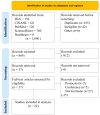Leveraging mHealth and Virtual Reality to Improve Cognition for Alzheimer's Patients: A Systematic Review
- PMID: 36292292
- PMCID: PMC9602027
- DOI: 10.3390/healthcare10101845
Leveraging mHealth and Virtual Reality to Improve Cognition for Alzheimer's Patients: A Systematic Review
Abstract
Background: Alzheimer's Disease (AD) is a global problem affecting 58 million people, expected to reach a prevalence of 88 million people by 2050. The disease affects the brain, memory, cognition, language, and motor movement. Many interventions have sought to improve memory and cognition. mHealth and virtual reality (VR) are two such interventions.
Objectives: To analyze studies from the last 10 years with older adults with AD to ascertain the effectiveness of telehealth techniques such as mHealth and VR for memory care.
Methods: In accordance with the Kruse Protocol and reported in accordance with PRISMA 2020, five reviewers searched four research databases (PubMed, CINAHL, Web of Science, and ScienceDirect) on 3 August 2022 for studies with strong methodologies that fit the objective statement.
Results: Twenty-two studies from 13 countries were analyzed for trends. Four interventions (mHealth/eHealth, VR, mHealth + VR, game console, and telephone) used RCT, quasi-experimental, pre-post, observational, and mixed methods. These interventions improved cognition, memory, brain activity, language, depression, attention, vitality, quality of life, cortical atrophy, cerebral blood flow, neuro plasticity, and mental health. Only three interventions reported either no improvements or no statistically significant improvements. Cost, time, training, and low reimbursement were barriers to the adoption of these interventions.
Conclusion: mHealth and VR offer interventions with positive effectiveness for memory care for AD. The long-term effect of this improvement is unclear. Additional research is needed in this area to establish clinical practice guidelines.
Keywords: Alzheimer’s Disease; mHealth; memory care.
Conflict of interest statement
The authors declare no conflict of interest.
References
-
- Alzheimer’s Association . 2022 Alzheimer’s Disease Facts and Figures. Alzheimer’s Association; Chicago, IL, USA: 2022. pp. 131–168. - PubMed
-
- Patterson C. World Alzheimer Report 2018. Alzheimer’s Disease International; London, UK: 2018.
Publication types
LinkOut - more resources
Full Text Sources


